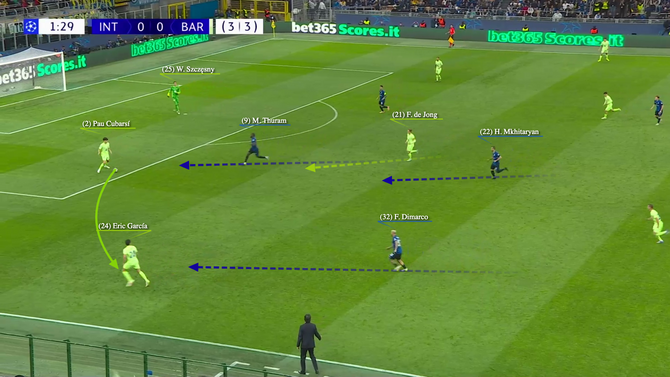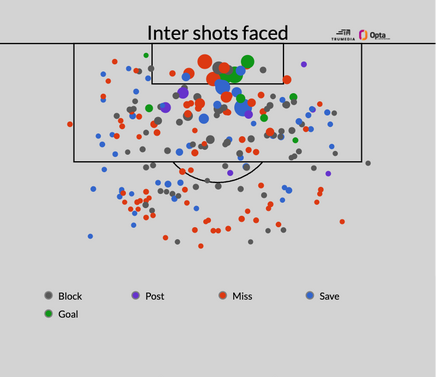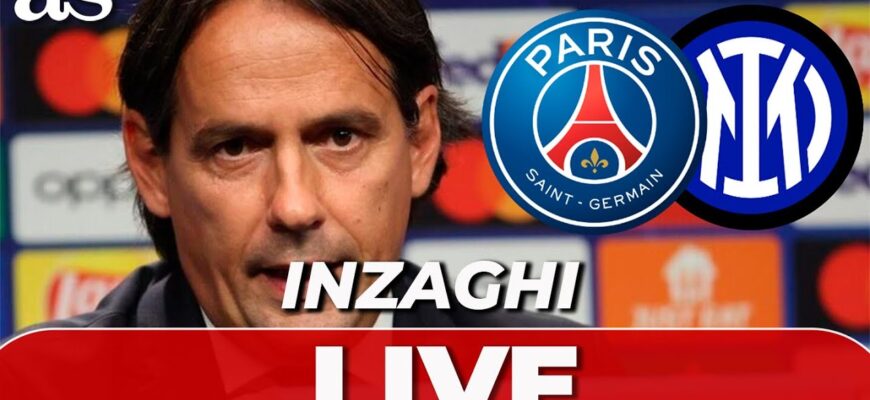If Inter Milan are to defy expectations and clinch the Champions League title, their defensive performance will undeniably be central to their success. Ideally for Simone Inzaghi, this won`t mean relying on miraculous saves as they did in some previous matches. Instead, the aim will be to prevent the opposition from creating dangerous opportunities in the first place.
Inter`s shape when out of possession could prove to be their hidden advantage in the final. What makes their approach so intriguing is its flexibility and unpredictability.
Consider the initial phase of the second leg against Barcelona. Inzaghi deployed some of Inter`s most aggressive pressing of the tournament, pushing his wing-backs high to pressure the opposing full-backs. This strategy relied on the wide central defenders winning their individual duels against attackers like Lamine Yamal and Raphinha.

In the image above, Henrikh Mkhitaryan tracks Frenkie De Jong`s movement, further discouraging a pass already covered by Marcus Thuram. Federico Dimarco advanced rapidly to cut off another passing lane, forcing Pau Cubarsi to settle for a sideways pass to Eric Garcia. This sequence was designed to force Barcelona`s play back towards their own goalkeeper, compelling them to play long into contests that Inter`s defenders were likely to win.
Nicolo Barella is a vital component in making this system effective. His energy allows him to cover ground, supporting the pressing strikers by blocking off quick passes to centre-backs and shielding passes to midfielders like De Jong. Throughout matches, he operates somewhat like an off-ball poacher. Even in a static image, you can sense his anticipation when an opponent receives the ball under pressure.
It is plausible that Inter might consider adopting a similar aggressive approach against Paris Saint-Germain, a team that also seeks to build play through the lines. However, this tactic against PSG would carry significant risk. Against Barcelona, the wide escape options were players like Eric Garcia, a centre-back playing wide, and young full-back Gerard Martin – challenging opponents, but not on the same level as PSG`s potential threats.
PSG, in contrast, possess elite wide players like Nuno Mendes and Achraf Hakimi, considered among the best in their position globally. As seen when Inter adjusted their defence against Barcelona (with Denzel Dumfries dropping deeper), allowing space on the flanks can be heavily exploited – Martin provided two assists in that scenario. PSG`s top-tier wing-backs could be even more devastating.
Then again, Inter are not bound to play this way. They are perfectly capable of retreating and defending in a deeper block. Their average Passes Per Defensive Action (PPDA) across the competition is 15.7, indicating they often sit off and absorb pressure. If necessary, they are well-prepared to `park the bus`.
As Pep Guardiola noted early in the Champions League campaign, before his side was held to a 0-0 draw, Inter can press high and mark tightly but also defend with a typical Italian `suffering` mentality. However, sometimes this deep defence can cross into relying more on fortune than impeccable positioning, as perhaps evidenced by moments in the clean sheet earned against Manchester City.
Nevertheless, this is a team that is comfortable surviving periods of intense pressure within their own penalty area. Out of the 36 teams in the league phase, only nine allowed opponents more than 30 touches in their box per game. Inter and Feyenoord were the only teams from that group to reach the knockout stages. While this statistic is certainly influenced by difficult matches against sides like Barcelona and Bayern Munich, it confirms Inter`s comfort level when defending deep.

Throughout the tournament, Inter have shown a willingness to trust their players to block shots. Efforts from opponents like Arsenal (ten blocks), Bayern Munich (eight blocks at the San Siro), and even Young Boys (seven blocks involving players like Yann Aurel Bisseck) highlight this resilience. With the excellent Yann Sommer positioned behind them, Inter possess the capability to bunker down effectively if the match situation demands it.
It`s unlikely Inter will want to rely solely on deep defending for the entire 90 minutes, just as Inzaghi wouldn`t want his players exhausting themselves chasing PSG relentlessly. However, by strategically combining moments of aggressive pressing with periods of disciplined deep defence, Inter could find the tactical balance needed to be the deciding factor in this monumental final.







